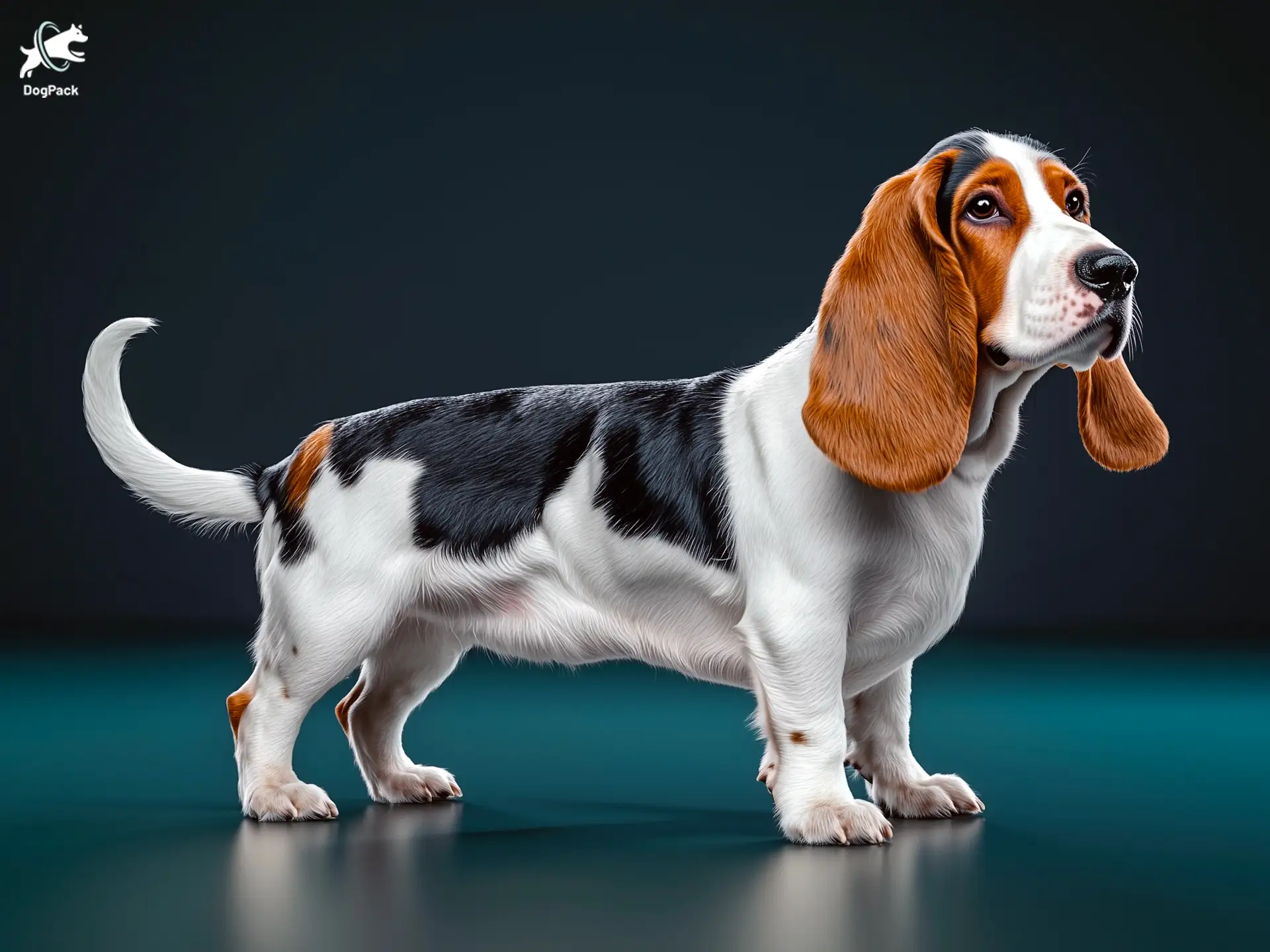Basset Artésien Normand Dog Breed Info & Overview
The Basset Artésien Normand, a charming French hound, stands out with its short legs, long ears, and soulful eyes. Originally bred for hunting small game, this breed brings together a sharp nose and a warm, loving nature. Known for their calm temperament, they make ideal companions for both families and individuals. Whether out in the field or at home, this delightful hound is sure to capture hearts with its friendly demeanor.
Characteristics
Pictures
Breed History
Originating in France during the early 19th century, the Basset Artésien Normand was developed by crossing Norman and Artois bassets. French hunters desired a dog that could track game through dense underbrush while being easy to follow on foot. The breed quickly became popular for its excellent scenting abilities and steady pace.
Originally used for hunting rabbits and hares, these dogs proved to be versatile and reliable companions in the field. The Basset Artésien Normand’s short stature allowed it to navigate under low branches and through thick vegetation, making it ideal for rural French landscapes. Their development was carefully guided to preserve their hunting instincts.
In 1924, the breed was officially recognized by the French Kennel Club, cementing its status in canine history. Although less known outside of France, the Basset Artésien Normand has maintained a loyal following among enthusiasts who appreciate its unique blend of hunting prowess and affectionate nature.
Temperament, Personality
Known for their gentle and friendly demeanor, these dogs make excellent family pets. They are affectionate with their owners and get along well with children, often displaying a patient and tolerant attitude. Their sociable nature means they generally enjoy the company of other dogs, making them a good choice for multi-pet households.
While they are calm indoors, the Basset Artésien Normand can be quite determined when they catch an interesting scent. This breed possesses a keen sense of smell inherited from their hunting ancestors. Owners may find them occasionally stubborn, but consistent training and positive reinforcement usually yield good results.
These dogs are known for their expressive faces and soulful eyes, often using their charm to get an extra treat or two. They thrive on companionship and may not do well if left alone for extended periods. Overall, they are loyal and devoted friends who enjoy being part of family activities.
Physical Characteristics
The Basset Artésien Normand is a medium-sized hound with a long body and short legs, standing about 12 to 14 inches (31–36 cm) at the shoulder. They have a sleek, muscular build that reflects their athletic abilities. Their coat is short and smooth, typically featuring tricolor patterns of white, tan, and black.
One of their most distinctive features is their long, velvety ears that hang gracefully beside their cheeks. These ears are not just for show; they help funnel scents towards the dog’s nose. Their eyes are large and expressive, often giving them a gentle and pleading appearance that endears them to many.
With a well-proportioned head and a slightly domed skull, they exhibit classic hound characteristics. Their tail is carried high and may have a slight curve. Despite their short legs, they are quite sturdy and capable of covering rough terrain with ease, a testament to their hunting heritage.
Health Issues
Generally a healthy breed, the Basset Artésien Normand can be prone to certain health issues common among hounds. One concern is ear infections due to their long ears, which can trap moisture and debris. Regular ear cleaning is essential to prevent infections and maintain overall ear health.
Like many breeds with a long back, they may be susceptible to spinal problems such as intervertebral disc disease. Owners should discourage activities that involve excessive jumping to protect their spine. Weight management is also crucial, as excess weight can put additional strain on their back and joints.
Eye conditions like glaucoma or entropion can occur, so routine veterinary check-ups are important. Responsible breeders often screen for genetic conditions to reduce the risk of inherited health problems. Maintaining a regular healthcare routine will help ensure that these dogs lead long and healthy lives.
Grooming Needs
With their short and smooth coat, the Basset Artésien Normand requires minimal grooming. A weekly brush with a soft bristle brush or grooming mitt is usually sufficient to remove loose hairs and keep their coat shiny. During shedding seasons, more frequent brushing may help manage increased hair loss.
Due to their low stature, they can pick up dirt and debris during walks, so occasional baths may be necessary to keep them clean. It’s important to use a gentle dog shampoo to prevent skin irritation. Regularly checking their skin for any signs of irritation or parasites is also recommended.
Special attention should be given to their ears and nails. Cleaning their ears weekly can prevent infections, while trimming their nails every few weeks will keep their feet healthy. Dental hygiene is equally important; brushing their teeth several times a week can help prevent dental diseases.
Exercise Requirements
Although not excessively energetic, these dogs do require daily exercise to stay fit and mentally stimulated. A brisk walk of about an hour each day will usually suffice. They enjoy exploring their surroundings, so allowing them time to sniff and investigate during walks can be beneficial.
Because of their hunting background, they have a strong prey drive and excellent scenting abilities. Activities that engage their nose, such as scent work or tracking games, can provide both physical and mental stimulation. This can help prevent boredom and the development of undesirable behaviors.
It’s important to keep them on a leash or within a securely fenced area when outdoors. Their instinct to follow scents may lead them to wander off if given the chance. Providing a variety of activities can help keep the Basset Artésien Normand happy and healthy.
Training Tips
Training this breed requires patience and consistency, as they can be a bit stubborn at times. Using positive reinforcement techniques such as treats and praise tends to be most effective. Harsh training methods are not recommended and may damage the trust between the dog and owner.
Early socialization is important to help them become well-adjusted adults. Exposing them to different people, places, and other animals can reduce shyness or apprehension. Basic obedience training should start when they are puppies, focusing on commands like sit, stay, and recall.
Incorporating scent-based games into training sessions can make learning more engaging for them. Since they are motivated by food, using treats can encourage them to participate eagerly. Consistency is key, and short, frequent training sessions often yield the best results with the Basset Artésien Normand.
Nutrition, Diet
Feeding this breed requires attention to portion control to prevent obesity, which can exacerbate health issues like back problems. A high-quality dog food formulated for medium-sized breeds with moderate energy levels is typically appropriate. Dividing their daily intake into two meals can help with digestion and prevent overeating.
On average, they may require about 1.5 to 2 cups of dry food per day, but the exact amount can vary based on age, activity level, and metabolism. It’s advisable to consult with a veterinarian to determine the specific dietary needs of your Basset Artésien Normand.
Including foods that support joint health, such as those rich in omega-3 fatty acids, can be beneficial. Treats should be given sparingly and accounted for in their daily calorie intake. Fresh water should always be available to keep them hydrated.
Adoption, Breeders
Finding a Basset Artésien Normand may require some research, as they are not as common outside of France. Reputable breeders can provide health clearances and detailed information about the breed. Visiting the breeder to meet the puppies and their parents can give insight into their temperament and living conditions.
Adoption is another option worth considering. Occasionally, breed-specific rescue organizations may have Basset Artésien Normands in need of a home. Websites like the Fédération Cynologique Internationale (FCI) or the SociétéCentrale Canine (French Kennel Club) offer resources and contacts for locating breeders and rescue groups.
When selecting a breeder, ensure they adhere to ethical breeding practices and prioritize the health and well-being of their dogs. Avoid puppy mills or sellers who cannot provide proper documentation. Taking the time to find a reputable source will contribute to a positive experience with your new companion.
Family Pet?
The Basset Artésien Normand makes an excellent family pet due to its gentle and affectionate nature. They are known to be good with children, often forming strong bonds and enjoying playtime. Their calm demeanor means they can adapt well to various household environments.
These dogs generally get along with other pets, especially if raised together from a young age. Their sociable personality allows them to coexist peacefully with other dogs, and with proper introductions, they can even get along with cats. However, small animals may trigger their hunting instincts.
Because they thrive on companionship, they do best in homes where they are not left alone for long periods. Including them in family activities can enhance their happiness and strengthen the bond. Overall, they are a wonderful addition to families seeking a loving and loyal pet.
Right For You?
If you’re looking for a medium-sized dog with a loving personality and moderate exercise needs, the Basset Artésien Normand could be a great match. They are well-suited for individuals or families who can provide companionship and engage in daily walks.
Potential owners should be prepared for some grooming maintenance and regular health check-ups, particularly concerning their ears and back. Patience in training and an understanding of their scent-driven nature will contribute to a successful relationship.
Those living in apartments or homes with limited space can accommodate this breed, provided they receive sufficient exercise. If you appreciate a dog with a rich history and a gentle soul, the Basset Artésien Normand might just be the perfect companion for you.
Conclusion
With their affectionate nature, manageable size, and endearing looks, the Basset Artésien Normand offers a wonderful blend of companionship and charm. They are suitable for a variety of households, including families and seniors, provided their moderate exercise and social needs are met. If you’re considering adding a loyal and gentle friend to your life, this delightful French breed may be the perfect choice.
FAQs
-
Is the Basset Artésien Normand suitable for first-time dog owners?
Yes, the Basset Artésien Normand can be a good choice for first-time owners due to its gentle temperament and moderate exercise needs. However, patience with training and attention to grooming and health care are important.
-
What is the difference between a Basset Artésien Normand and a Basset Hound?
While both breeds are short-legged hounds from France, the Basset Artésien Normand is lighter and more agile than the Basset Hound. It has a slightly different head shape and is generally smaller in size.
-
How long can a Basset Artésien Normand be left alone?
The Basset Artésien Normand does not tolerate being alone for long periods. Leaving them alone for more than four hours may lead to separation anxiety or destructive behaviors. They thrive on companionship.
-
What kind of activities does a Basset Artésien Normand enjoy?
This breed enjoys activities that engage their sense of smell, such as tracking and scent games. They also appreciate leisurely walks and spending quality time with their owners, making them great companions.
-
Are Basset Artésien Normands prone to obesity?
Yes, the Basset Artésien Normand can be prone to weight gain if overfed and under-exercised. Monitoring their diet and ensuring they receive regular exercise is crucial to maintaining a healthy weight.
Breed Ratings
The Basset Artésien Normand is moderately intelligent but can be stubborn. They respond well to consistent, positive training methods.
This breed enjoys playtime and can be quite playful, especially with children and other dogs. They love interactive games.
With moderate energy, they are content with daily walks and some playtime but don’t require intense exercise routines.
They shed a moderate amount year-round. Regular brushing can help manage shedding and keep their coat healthy.
As a scent hound, they have a strong prey drive. They may chase small animals if not properly supervised or trained.
Their short coat is easy to maintain with minimal grooming. Regular ear cleaning is essential due to their long ears.
Training can be challenging due to their independent nature. Patience and positive reinforcement are key to successful training.
They prefer company and may develop separation anxiety if left alone for extended periods. They thrive when around people.
They may bark or howl occasionally, especially when excited or left alone. Training can help manage excessive vocalization.
Drooling is minimal but may occur, particularly after eating or drinking. They are generally not heavy droolers.
The Basset Artésien Normand is very sociable with other dogs and enjoys canine companionship, making them good in multi-dog homes.
Generally healthy with proper care, but attention is needed for ears, back, and weight management to prevent health issues.














